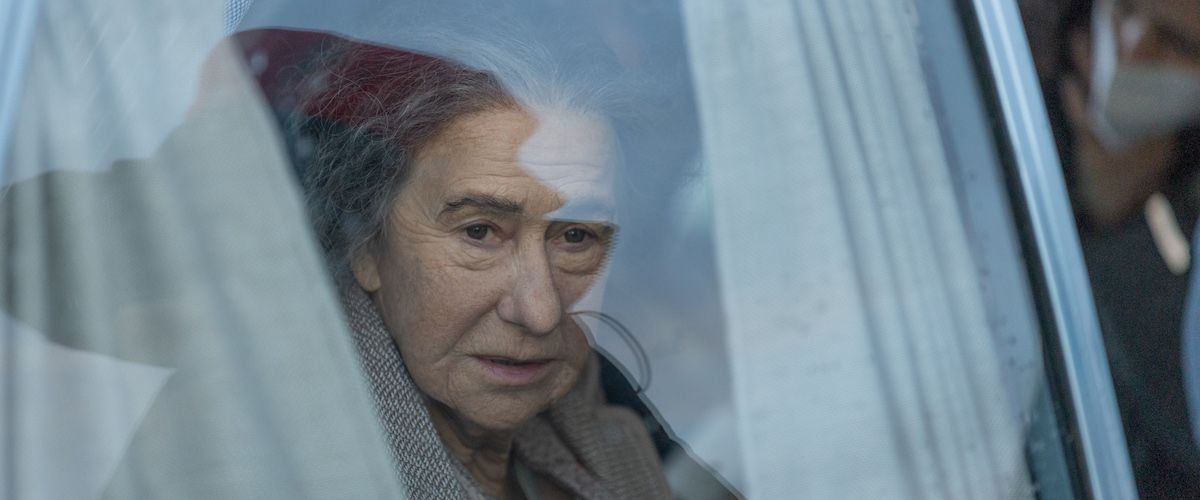Jonah Naplan August 27, 2023
Covered head to toe in heavy prosthetics and intoxicating clouds of cigarette smoke for most of her screentime, Helen Mirren portrays Golda Meir, the only female Prime Minister of Israel, in such a fascinating light that we wish she was given a better movie to demonstrate her chops.
Israeli director Guy Nattiv makes it doubly self-defeating to think about either way Helen Mirren is feigning gravitas. A 75-year-old Golda Meir was integral to the 19 days of the Yom Kippur War in 1973. The Arab and Egyptian military attacked the holy country during sacred times of fasting and reflection, putting the film on two different tracks. The first is Golda Meir’s relations with top military advisors in various conference rooms, as well as with U.S. Secretary of State Henry Kissinger (Liev Schreiber), debating what to do, how to react, with or without violence. The second is Meir’s relationship with herself internally; not just how she processes these events and her role in deciding what to do about them, but also her own dwindling health and state of mind.
Click … pfff … click … is a common pattern of sounds in the film. Golda is a heavy chainsmoker. Her lighter is her best friend. She smokes under stress, in celebration, sadness, and even as she lies helplessly in a hospital bed, ailing from lymphoma. She smokes in between words, conversations, and thoughts of war. Though we never see what the fumes are doing to her body internally, Nattiv, working from a script by Nicholas Martin, doesn’t shy away from depicting their external effect. Golda’s languorous dreams are portrayed through woozy, spiraling camerawork to a nauseating result, and sudden blasts of archival war footage interspliced between shots of Meir looking soulfully into the camera further cement the web of historical context.
Mirren’s subtle but complex performance is the strongest part of “Golda,” so it’s unfortunate that she feels at a frustrating arms distance away. Nattiv is handling big ideas and metaphors beyond just the woman at the film’s center. Flocks of birds perhaps represent the band of dispatched Israeli soldiers, though that could be up for different interpretation; a solid scene over a bowl of borscht boasts some of the most thoughtful dialogue between Meir and Kissinger—a welcome dynamic; and supporting characters Moshe Dyan (Rami Heuberger), the one-eyed Defense Minister, and Israeli military chief David “Dado” Elazar (Lior Ashkenazi) are important touches.
Meir has a warm friendship with her loyal caregiver Lou (Camille Cottin), who spends time pulling out chunks of Golda’s hair as a harsh outcome of her chemotherapy. It’s quiet moments like these that Nattiv proves he’s the strongest at. As in the case of more dramatic scenes, the narrative is often at a struggle to uphold itself. So fraught with menace was this war, but its outcome is never represented to full effect. After a certain point, “Golda” becomes less about Meir as a hero, and more about her as a villain—to her own body, at least. Though we didn’t know much about the deadliness of smoking at the time, Golda’s addiction is mostly seen as a sickness, by both her conscience and that of others. To drive a point home, Nattiv has Meir remove her oxygen mask on her death bed to take one last puff, before handing the camera over to its closing shots.
“Golda” posits that the more and more civilians were obliterated, the further Meir fell into disrepair. It is not just the nicotine that killed her, but also the stress of watching thousands of people die right under her prosthetic nose. Mirren’s expressive face conveys this so well that it’s hard not to think about what a better movie could have done with such a focused, pained lead.
Cinematographer Jasper Wolf paints a lot of memorable imagery—the atmosphere of cramped meeting rooms, never-ending staircases, and corpse-filled morgues—and all of it is matched with the same visceral energy of Mirren’s performance. The strings-filled score by Dascha Dauenhauer and the editing by Arik Lahav-Leibovich assists in filling out every last nook and cranny of this period piece, but the dispiriting script remains devoid of enough laborious character development that they get perversely canceled out.
There’s something majestic hidden inside “Golda,” but it’s never given the chance (or maybe the permission?) to rise or fall to anything especially unique. Though most biopic tropes become that way in the first place because they’ve been consistently proven to work, it rarely feels as much like a snake eating its own tail as it does here. As Israel in real life soon enters the weeks of Rosh Hashanah and Yom Kippur, a biopic about one of their greatest influencers should feel weightier. But although Mirren rises to the occasion with grit, much of the reality surrounding her performance serves up a perfunctory dish. In a world where Israel is still tirelessly fighting for their freedom, “Golda” arrives bearing an empowering statement before tumbling into a grassy knoll.
Now playing in theaters.

